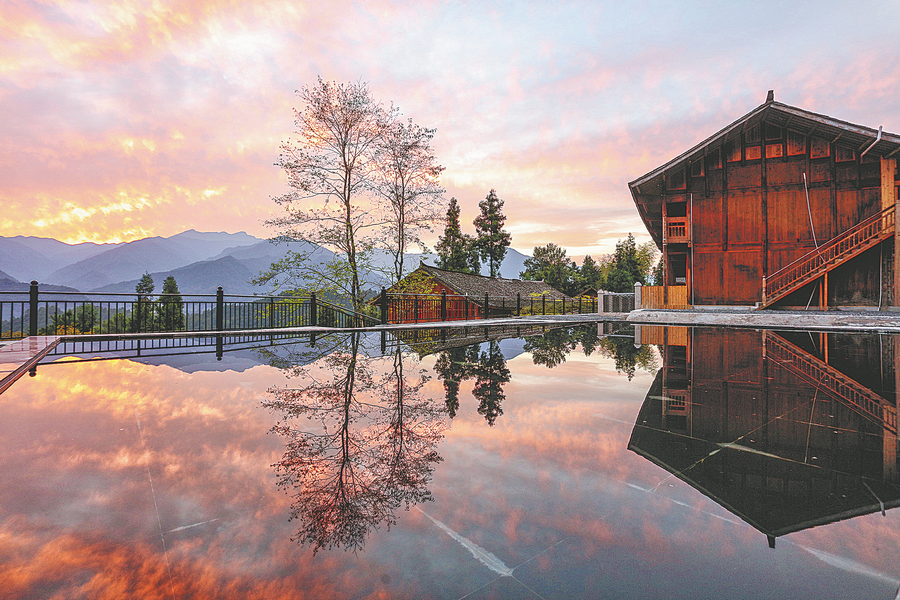Rural idyll gives village a natural advantage


Liu Qiaohua can now get 15,000 yuan a year for renting her house and a monthly salary of 3,000 yuan by cleaning the guest rooms.
"The income can cover my children's college tuition, and working close to home also allows me to take care of my parents," Liu says.
Baiyangping is one of the villages in Jiangkou that have ridden the wave of tourism development in the mountainous area.
About a 20-minute drive, Yunshe village has evolved into a popular rural getaway with its agreeable weather, natural beauty and ethnic culture.
Many have come to appreciate the folk songs and dances of the local Tujia community, ancient papermaking techniques as well as the primitive natural atmosphere of Yunshe, where women wash clothes by a creek, and men remove weeds on river banks with a sickle.
Tang Ji chose to stay in Yunshe and run a homestay business after Fanjing was added to UNESCO's World Heritage list in 2018. He was born in Jiangkou and engaged in space design in Guangzhou, Guangdong province, after graduation from the Xi'an Academy of Fine Arts. He was attracted to the rustic charm of Yunshe during his earlier travels.
"You can soak your feet in the gurgling water to beat the summer heat, and play with ducks in the river," Tang says.
"It is a rare hidden getaway that is also full of everyday life."
Tang had the idea of developing a homestay, so he rented an empty house and renovated it. With the idea of retaining the original look, Tang paved a stone road in front of the house, put up bamboo screens and hand-painted works featuring village scenery, and established a papermaking studio. Visitors can enjoy tea, party music, films, leaf-sculpting and painting on pebbles, as well as try their hand at cooking Tujia cuisine in an open kitchen at his homestay.
"Most travelers will choose to stay a night here after being on Fanjing Mountain," Tang says.
The boom in rural tourism also had local villager Yang Fenghua come back home and run a small inn with his family.
He used to do manual work in Jiangsu and Zhejiang provinces.
Now, his inn brings his family more than 6,000 yuan a month in turnover.
"It's much easier to make a living compared to working away from home," Yang says.
To date, more than 60 rural households in Yunshe are offering catering and accommodation services, and more than 800 people get involved in rural tourism operations, says Yang Zhengjun, a senior official in Yunshe.
It recorded more than 126,000 traveler visits in the first six months of last year, raking in 42.5 million yuan in tourism revenue. The village's per capita disposable income has reached 18,000 yuan.
To spice up traveler experience, local villagers have formed a team to offer dragon lantern dance and Tujia wedding ceremonies.
About 15-minute drive away, Zhaishadong village of Jiangkou, is also receiving dividends from the pristine ecology of the Mount Fanjing area.
Ran Qixun says he couldn't be more happier about his life. The 50-year-old local runs a three-story mountain villa that can cater to 200 dining guests and has 15 guest rooms.
"A few years ago, planting crops, chopping woods for sale were our main sources of income," Ran says.
His family then hitched their wagon to the tourism development of Mount Fanjing.
In the best of times, Ran's villa is fully booked and delivers a daily turnover of 5,000 yuan.
His son has also got a job at the village's folk culture performance team.
























